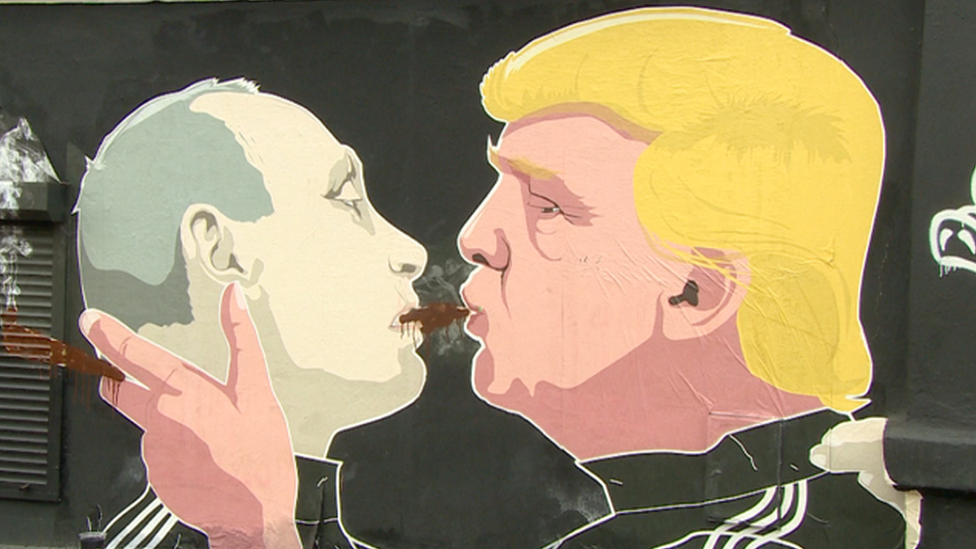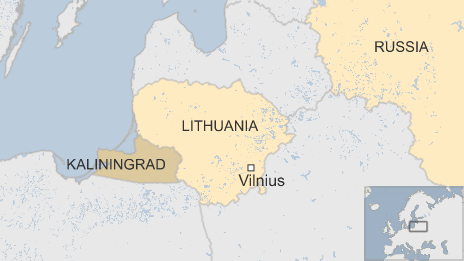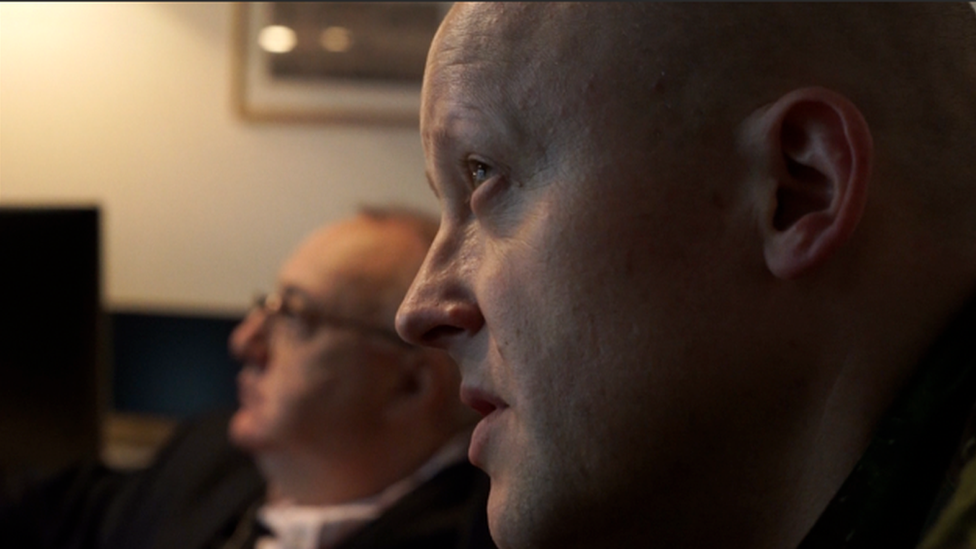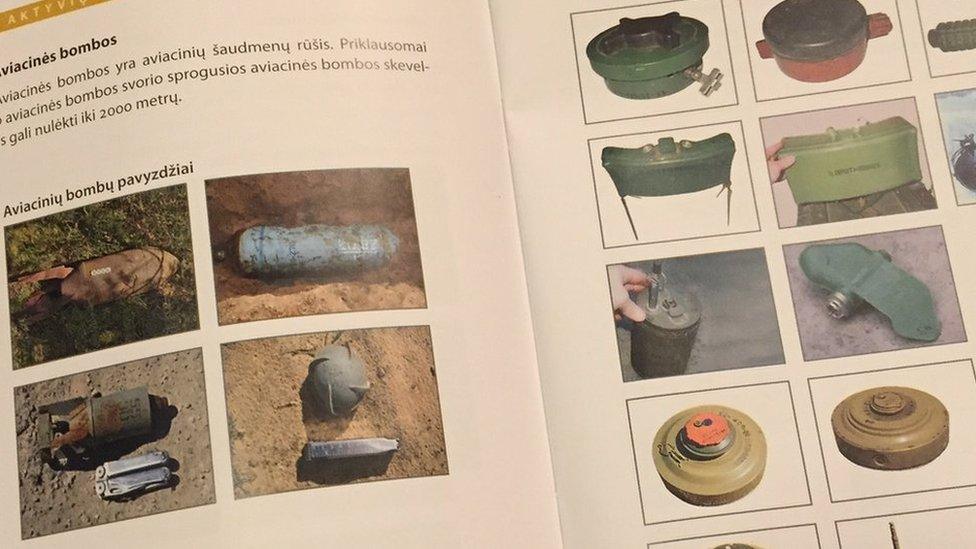Trump election: Baltic warning over Russian move on Nato
- Published
Kevin Connolly reports from the Lithuanian capital Vilnius: "Lithuania sees a real threat from Russia"
Lithuania has warned that Russian President Vladimir Putin may test Nato in the weeks before Donald Trump becomes US president.
Foreign Minister Linas Linkevicius said he was "very afraid" for the Baltics, as well as the Syrian city of Aleppo.
Nowhere is the troubled transition of Donald Trump being watched more carefully than in the Baltic states.
Lithuania believes its dark view of Russian intentions is justified by its geography and its history.
Once part of the Soviet Union, it is now a member of both Nato and the European Union. It has a land border with the Russian exclave of Kaliningrad on the Baltic Sea.
In the capital, Vilnius, there is a mural showing Mr Trump and Russian President Vladimir Putin locked in a passionate embrace.
How Lithuania's independence protesters sang on the barricades
The government naturally expresses its views in less lurid terms but it shares the basic concern of the artist that Mr Trump and Mr Putin are too close for comfort.

Lithuanian vitriol: An unflattering mural in Vilnius shows local attitudes
The fear here is that the United States is keen to see Russia as a potential partner and reluctant to share the view in Eastern Europe that Moscow presents a potent and immediate military threat.
Lithuanian Foreign Minister Linas Linkevicius told the BBC simply: "Russia is not a superpower, it's a super problem."
Russia insists it is not a threat, arguing that Nato is responsible for stoking regional tensions by expanding eastwards and moving its military hardware towards Russian borders

Russian military build-up in Kaliningrad

The Russian exclave of Kaliningrad represents an important military outpost between Poland and Lithuania with its coastline on the Baltic Sea.
The accumulation of radars and air defence systems, as well as coastal anti-shipping missiles, all form part of Moscow's developing "anti-access and area denial strategy", which in essence seeks to push Nato forces away from Russia and to make it very difficult to reinforce Nato members in the Baltic region in the event of a crisis.
Strengthened under comprehensive reform of Russian armed forces announced in 2008. From 2008-2014 saw significant increases in personnel in missile, naval infantry, rifle and artillery brigades, in some cases doubled
From 2012, deployment of new S-400 long-range air defence system (Nato name: SA-21 Growler)
From 2012, deployment of Iskander-M short-range, nuclear-capable ballistic missiles. New deployment announced in October 2016
October 2016: Two Buyan-class corvettes assigned to Baltic Fleet, armed with nuclear-capable Kalibr cruise missiles (Nato name: Sizzler)
Coastal defences currently being strengthened with Bal land-based anti-ship missile system and Bastion mobile anti-ship defence system, Izvestia reports

Mr Linkevicius said there was a danger that Mr Putin would see the period between now and the inauguration of Donald Trump in January as an opportunity to test the military preparedness and diplomatic determination of the Western alliance.
"The new administration doesn't come in until the second part of January," he said. "I'm very afraid and concerned about this period not just because of the regions which are close to here but let's hope that Aleppo is not smashed from the ground by then."
'We're not naive'
Lithuania has noted with alarm that Moscow has been reinforcing and re-equipping its powerful military bases in Kaliningrad.
It is only 25 years since an order was given from Moscow to send in the tanks to crush peaceful protests for independence in Vilnius.

Lithuanian army major Linas Idzelis says the Russian threat is not imminent but it is growing
The Russian Federation and Lithuania were both republics within the Soviet Union back then but opposition politician Gabrielius Landsbergis says that is not really relevant.
The events of 1991 were still essentially about Russia throwing its weight around in a neighbouring country.
"The best countries to understand Russia are always those who are closest to it," he told the BBC.
"As a child I still remember the sound of the tanks rolling through the streets of Vilnius so even my generation - and I'm 34 - still remembers when the Russians were here as a Soviet army. But they were Russian troops and they were invading us, so the last thing we are on this subject is naive."
More on Russia and Trump:
It might seem hard to understand in far-off Washington, where diplomats have spoken of their desire to "reset" relations with Russia, but Lithuania treats the possibility of invasion very seriously.
Officials will tell you that the country is well on course to increase its defence spending to the Nato-recommended target of 2% of its annual budget. Lithuania is determined to show the United States it is a reliable partner in the Western alliance.
It has also reintroduced military conscription and produced an extraordinary pamphlet which advises its civilian population on what to do in the event of a Russian invasion.

A Lithuanian pamphlet gives its citizens advice in preparation of a potential Russian invasion
It includes instructions on how to identify different Russian armoured vehicles and how to provide information to Lithuania's armed forces in time of war.
When I put it to Lithuanian military officer Major Linas Idzelis that it created a rather alarmist impression that the Russians were coming, his answer was emphatic.
"It's an alarm, yes," he said. "It's an alarm that says not that they are coming but that the threat is growing and is growing every day."
Elsewhere in Europe there has been talk of the need to "teach" Donald Trump about the continent. Lithuanian leaders have been much more tactful than that.
But they have also made it clear that they hope Mr Trump will settle into office quickly and come to share their view of Russia as more of a threat than a potential partner.
The belief runs very deep here that their future security depends on it.